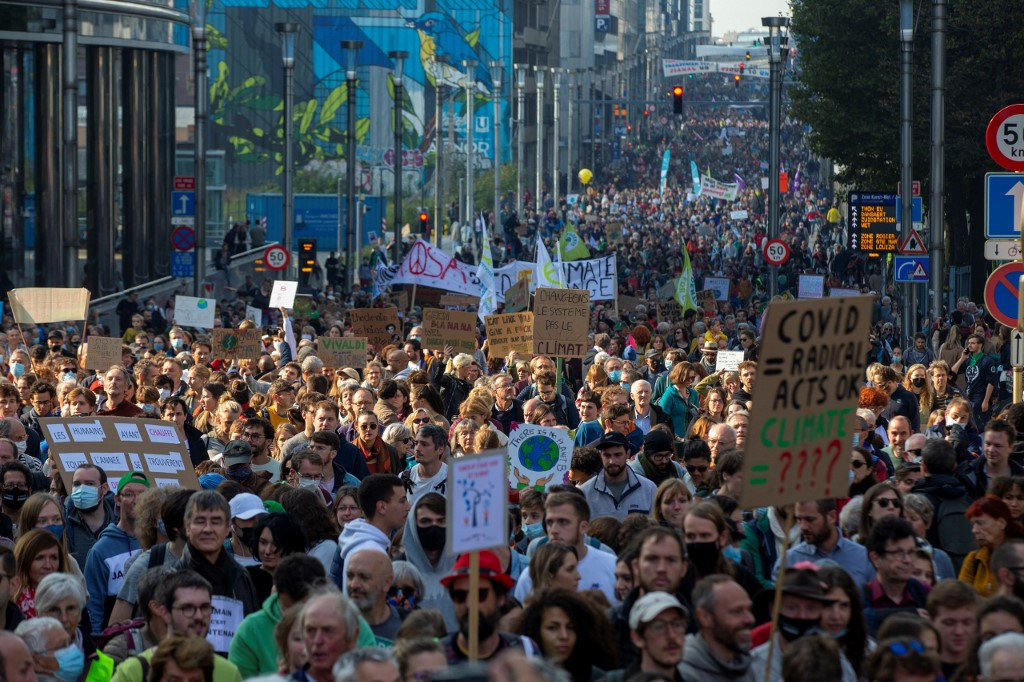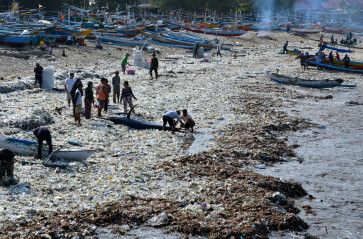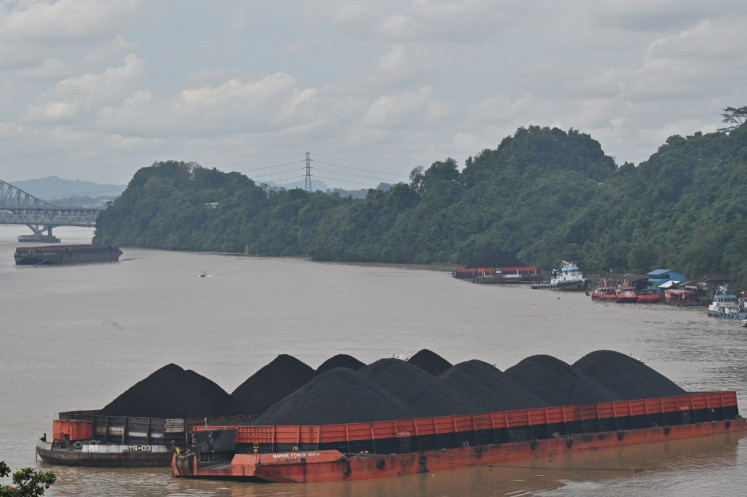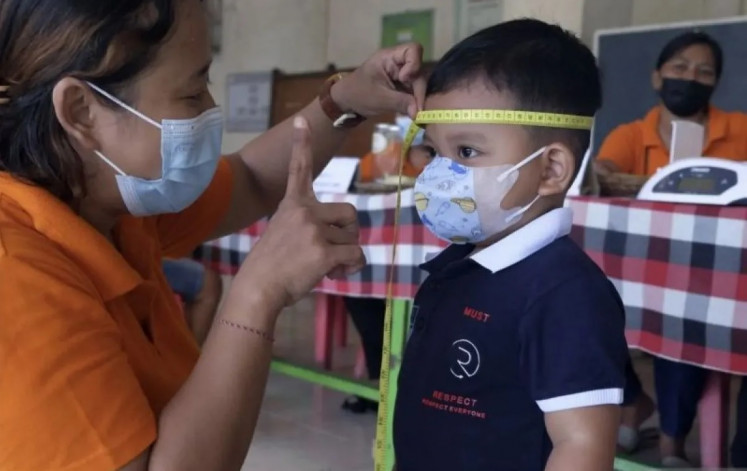Diplomats push to finalize carbon trading rules in public discussion
As the days count down to COP26, a virtual public discussion of diplomats in Jakarta has concurred that the time is nigh for parties to the Paris Accords to stop haggling and finalize the mechanism for international emissions trading.
Change text size
Gift Premium Articles
to Anyone

A
mere two weeks before the 26th United Nations climate change conference (COP26) opens in Glasgow, diplomats in Jakarta are pushing for the completion of international rules to govern emissions trading, a highly technical but potentially effective scheme mandated by the 2015 Paris Agreement, also known as the Paris Accords.
The stakes could not be higher for the parties to the agreement to conclude their provisions on carbon emissions trading and other forms of international cooperation under Article 6 of the climate deal, one of the last articles left unresolved in the 2018 Paris rulebook.
Complexity was a big reason why Article 6 was not agreed until the final morning of the Paris negotiations in 2015 or at subsequent COPs, so the issue is expected to be in the spotlight at COP26 in November, considered by many to be decisive for the future of the planet and all living creatures on it, including human beings.
Read also: Big nations urged to heed climate activists’ demands for bolder action
The upcoming climate conference could be an important milestone for the world to agree on “the biggest challenge to the Paris Agreement”, including Article 6, according to Deputy Foreign Minister Mahendra Siregar.
“These issues need to be concluded this year for the effective and full implementation of the [accords],” Mahendra said on Monday during a virtual discussion organized by the Foreign Policy Community of Indonesia (FPCI) and livestreamed on YouTube.
Trust and transparency
Without clarity and progress on the mechanism for implementing the Paris Agreement, Mahendra added, the world ran the risk of losing trust in the multilateral process.
A number of foreign ambassadors attending the discussion concurred with him.
Mexican Ambassador to Indonesia Armando Alvarez said that countries needed to reach an agreement on the carbon market and continue working on bolstering transparency for COP26 to be successful.
Separately, Japanese Ambassador to Indonesia Kenji Kanasugi said that concluding negotiations on Article 6 would “promote efficient and additional emissions reductions”. He added that Tokyo was already working closely with Jakarta on monitoring emissions.
The concept behind establishing an international carbon market is that it would allow countries to receive credits for reducing emissions in excess of their targets, which could then be sold to countries struggling to meet their own commitments.
If the rules were structured appropriately, according to researchers at the World Resources Institute (WRI), Article 6 could result in a win-win solution for all countries involved, and “the world gets a step closer to avoiding catastrophic climate change”.
But the idea of an international carbon market is not without controversy.
In an article she wrote for the World Economic Forum’s Sustainable Development Impact Summit, Greenpeace International executive director Jennifer Morgan said that carbon markets would put “nature and indigenous communities under excruciating pressure”.
“No outcome on carbon offset markets under Article 6 would be acceptable to safeguard, protect and uphold human rights, especially the rights of indigenous peoples and traditional communities, and to ensure environmental integrity,” she said.
With and without assistance
Home to one of the world’s three largest tropical rainforests, Indonesia has an important role to play in responding to the urgent call for climate action.
Indonesia’s climate commitments, outlined in its Nationally Determined Contribution (NDC) as required by the Paris Agreement, include slashing emissions by 29 percent by 2030, relative to a business-as-usual (BAU) baseline of 2.87 gigatons of carbon emission equivalent (CO2e). With sufficient international support, however, the country pledged to cut emissions by 41 percent over the same period and to reach net-zero emissions by 2060.
Officials have said that the BAU scenario would require around US$365 billion in investments, while the alternative would cost rich countries around $479 billion in assistance.
British Ambassador to Indonesia Owen Jenkins said Indonesia’s net-zero commitment was among “the most important undertakings” around the globe.
“We're also delighted that the United Kingdom is working with Indonesia in the energy sector to accelerate the transition away from the dirtiest fossil fuels including coal and towards renewable energy,” he added.
The government is currently managing funds for multiple initiatives that include incentives for reducing the deforestation rate or restoring peatlands.
Critics have said, however, that the recent termination of one such pact with Norway served as a warning that highlighted the lack of political will in tackling the climate crisis.
Read also: Indonesia, Norway in blame game over collapsed deforestation pact
Meanwhile, European Union Ambassador to Indonesia and Brunei Darussalam Vincent Piket acknowledged that handling the climate crisis required global cooperation, and that Indonesia had a key role in the effort.
“Indonesia is a vital partner [...] given its potential to achieve [or] even overachieve its 2030 target,” he said at Monday’s virtual discussion.
Similarly, French Ambassador Olivier Chambard said his country was ready to assist Indonesia in moving its net-zero target closer to 2050.
World salvation or damnation
Next month’s COP26 comes amid growing unease over the climate crisis.
Earlier this month during the pre-COP26 event Youth4Climate in Milan, Italy, Swedish climate activist Greta Thunberg repeated her criticism of world leaders who she said were all talk and no action, AFP reported.
"They are all pretending they have solutions to the climate crisis and that they are taking sufficient actions, but we see through their lies and we see through their blah blah blah and we're tired of it," she said.
At the first session of the youth climate summit, UN Secretary-General Antonio Guterres once again called for urgent action to limit global warming to 1.5 degrees Celsius above preindustrial levels, the goal of the Paris Accords.
"I cannot emphasize enough that time is running out. Irreversible climate tipping points lie alarmingly close," Guterres told participating ministers. "We can either save our world or condemn humanity to a hellish future."









